Israeli checkpoint
An Israeli checkpoint (Hebrew: מחסום, mahsom, Arabic: حاجز, hajez), is a barrier erected by the Israeli Security Forces, primarily today part of the system of West Bank closures in the Israeli-occupied West Bank.
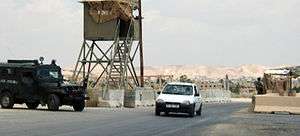
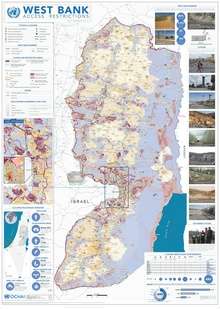
The checkpoints have the stated aim of enhancing the security of Israel and Israeli settlements and preventing those who wish to do harm from crossing.[1]
Israeli checkpoints may be staffed by the Israeli Military Police, the Israel Border Police, or other soldiers.[2]
Number of checkpoints
Since the 1990s, Israel has created hundreds of permanent roadblocks and checkpoints staffed by Israeli Military or border police.[3]
In September 2011, the United Nations Office for the Coordination of Humanitarian Affairs (OCHA) said there were 522 roadblocks and checkpoints obstructing Palestinian movement in the West Bank, up from 503 in July 2010. That number does not include the temporary checkpoints known as "flying checkpoints," of which there were 495 on average per month in the West Bank in 2011, up from 351 on average per month in the previous two years.
According to B'Tselem, there were 99 fixed checkpoints in the West Bank in September 2013, in addition to the 174 surprise flying checkpoints. In August 2013, 288 flying checkpoints were counted.[4]
However, according to the Israel Defense Forces, after withdrawing the majority of checkpoints as a goodwill gesture, in May 2013 there were 13 checkpoints in the West Bank, down from 40 in 2008. Furthermore, according to the IDF, these checkpoints are not always used, with the frequency of use depending on the perceived security threat.[5][6] This figure does not include the numerous road blocks that prevent Palestinians from crossing the barrier, which in many cases blocks access to areas within the West Bank.
IDF viewpoint
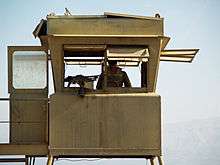
According to the IDF, a Palestinian civilian in the West Bank can travel from the northern city of Jenin to Bethlehem, just south of Jerusalem, without encountering a single military checkpoint.[5]
According to program director Col. Triber Bezalel, the IDF employs humanitarian officers at various checkpoints. These officers are tasked with making life easier for those who cross the borders and aiding the elderly and sick.[7]
Criticism
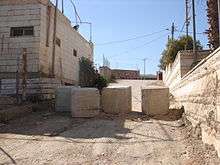
Many Palestinian residents of the West Bank claim that despite the checkpoints' intended use, in practice they violate Palestinians' rights to transportation[8] and other human rights. Palestinian complaints of abuse and humiliation are common: Israel Defense Forces' Judge Advocate General, Maj. Gen. Dr. Menachem Finkelstein, states that "there were many—too many—complaints that soldiers manning checkpoints abuse and humiliate Palestinians and that the large number of complaints 'lit a red light' for him".[9] Hundreds of Israeli women have monitored the checkpoints as part of Machsom (Checkpoint) Watch. The organization circulated daily reports on the checkpoints and published a book of testimonies that co-founder and author Yehudit Kirstein-Keshet says demonstrates "Israel's imprisonment of an entire population in a web of closures and checkpoints."[10] Kirstein-Keshet also reports, "We Watchers … have witnessed the daily humiliation and abuse, the despair and impotence of Palestinians at checkpoints."[11]
The United Nations, in its February 2009 Humanitarian Monitor report, has stated that it is becoming "apparent" that the checkpoint and obstacles, which Israeli authorities justified from the beginning of the second Intifada (September 2000) as a temporary military response to violent confrontations and attacks on Israeli civilians, is evolving into "a more permanent system of control" that is steadily reducing the space available for Palestinian growth and movement for the benefit of the increasing Israeli settler population.[12]
Flying checkpoints
Checkpoints and Medical Care
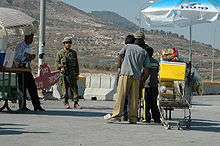
In March 2002, an explosive device was found in a Palestine Red Crescent Society (PRCS) ambulance. The Red Crescent expressed shock at the incident, and began an internal investigation.[13] On January 11, 2004, a PRCS ambulance not carrying patients was stopped and searched at a flying checkpoint near the village of Jit. The ambulance was escorted by military jeep to the Qadomin bus station where after 10 minutes the ambulance crew got their IDs back and were allowed to continue working. In another case, on the same day, an ambulance transporting a diabetic patient to the hospital in Tulkarm was stopped, searched, and allowed to proceed after the companion of the patient was arrested.[14]
In 2008, an Israeli soldier in command of a checkpoint outside Nablus was relieved from duty and imprisoned for two weeks after he refused to allow a Palestinian woman in labour to pass through. The woman was forced to give birth at the check point and the baby was stillborn. Between 2000 and 2006 at least 68 women gave birth at checkpoints of whom 35 miscarried and five died in childbirth, according to the Palestinian health ministry.[15]
See also
| Wikimedia Commons has media related to Israeli checkpoints in the West Bank. |
- West Bank closures
- Machsom Watch a human rights group of Israeli women monitoring IDF checkpoints.
- Palestinian freedom of movement
References
- "Key Maps". BBC News. Retrieved 2010-05-05.
- "Movement and Access in the West Bank". United Nations Office for the Coordination of Humanitarian Affairs occupied Palestinian territory. Retrieved 24 July 2012.
- [Franz Von Benda-Beckmann, Keebet von Benda-Beckmann, Julia M. Eckert, Rules of Law and Laws of Ruling: On the Governance of Law, Ashgate Publishing, Ltd., 2009, p. 93-98, ISBN 0754672395, 9780754672395
- Checkpoints, Physical Obstructions, and Forbidden Roads. B'Tselem, Updated 24 November 2013
- Reality check: The truth behind crossings in Judea and Samaria
- Central Command
- Leyden, Joel (30 Jan 2004). "Israel Sends IDF Humanitarian Officers to Front Lines". Jerusalem Post.
- Barahona, Ana (2013). Bearing Witness - Eight weeks in Palestine. London: Metete. p. 13. ISBN 978-1-908099-02-0.
- "Humiliation at the checkpoints - Haaretz Daily Newspaper | Israel News". Haaretz.com. Retrieved 2011-09-06.
- Kirstein Keshet, Yehudit (2006). Checkpoint watch: Testimonies from occupied Palestine. Zed. p. 39. ISBN 978-1-84277-719-0.
- Kirstein Keshet, Yehudit (2006). Checkpoint watch: Testimonies from occupied Palestine. Zed. p. 79. ISBN 978-1-84277-719-0.
- "The Humanitarian Monitor, Number 34, February 2009" (PDF). UN Office for the Coordination of Humanitarian Affairs. 2009-02-01. Archived from the original (PDF) on 2009-04-06. Retrieved 2009-04-06.
- Amos Harel, Amira Hass, Yosef Algazy, Bomb found in Red Crescent ambulance, Haaretz, March 29, 2002.
- "OCHA Humanitarian Update: Occupied Palestinian Territories". United Nations Office for the Coordination of Humanitarian Affairs (OCHA). 16 Dec 2003 – 19 Jan 2004. Retrieved 05.12.2007. Check date values in:
|accessdate=(help) - "Israeli jailed over baby tragedy". BBC News. 2008-09-12. Retrieved 2010-05-05.